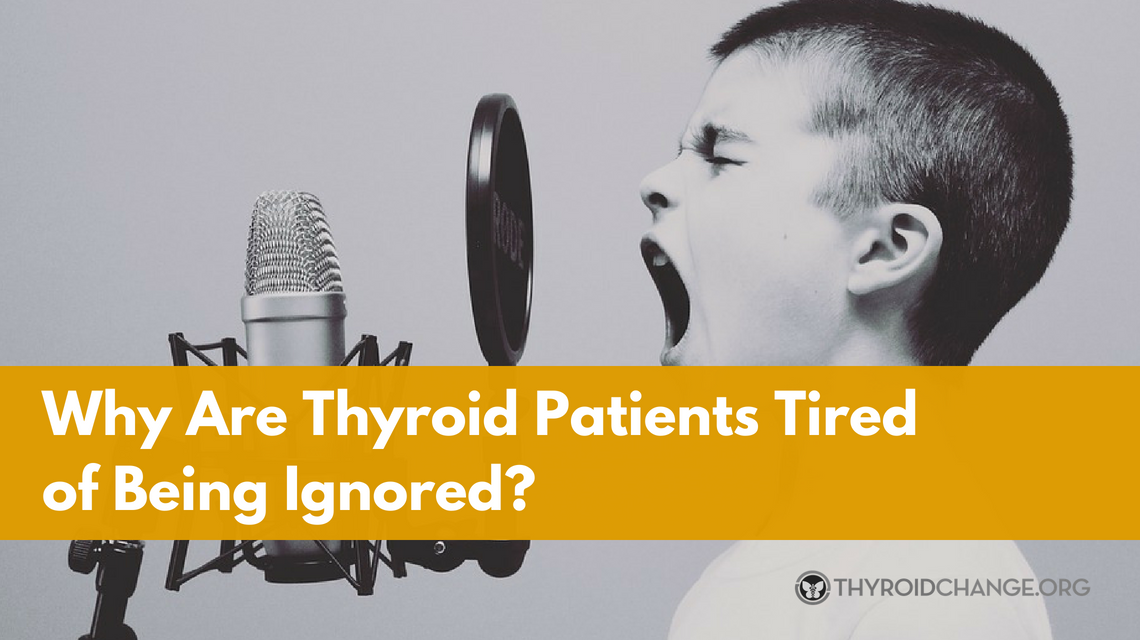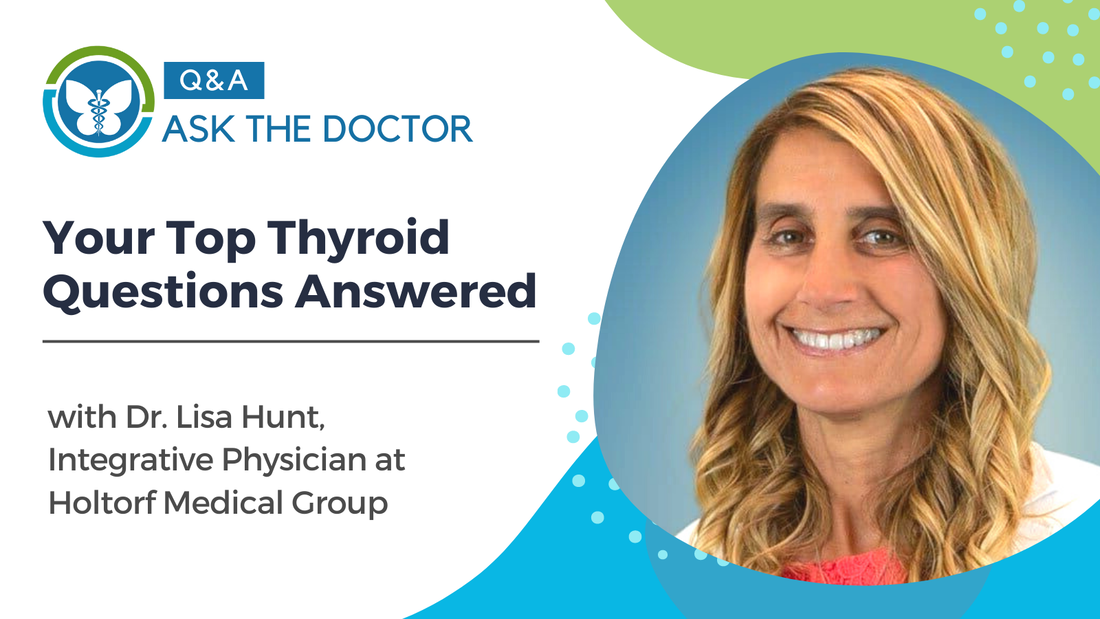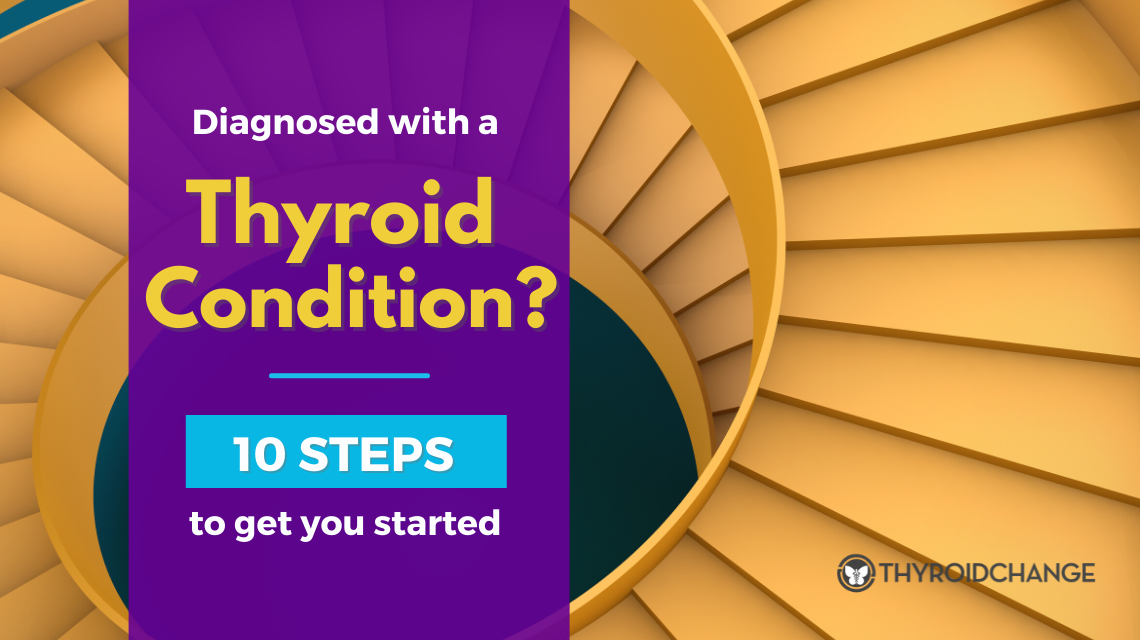14th Jun 2022
Why Are Thyroid Patients Tired of Being Ignored?

It’s 1988, I’m 28, married with two small kids and I’m sick all the time. Although I have bone-deep fatigue, my most annoying symptom is the overwhelming brain fog and short-term memory problems that make it almost impossible to get a grocery list together and get myself to the store and back without getting lost in my own neighborhood.I would push through any amount of pain and agony if I could still think.
I am sure this is a neurological problem.Because epilepsy runs in my family, I see a neurologist who tells me I need to look for psychiatric care because his tests show nothing physically wrong with me. I buy a book about hypochondria because I want to know why I would make myself sick like this. The book tells me I enjoy the attention I get while I’m sick, but I’m not getting attention. I’m getting nothing but disdain from everyone in my life. Everyone, including me, is tired of this song and dance. Still, he music doesn’t stop just because I’m tired of it. I realize that I don’t have hypochondria and I write an angry letter to my neurologist.
“The guilt is enormous, I feel as though it will crush me.”I quit school, the reading takes the effort of Hercules and the studio art classes are too strenuous. I do my best to care for my small sons. Frequently I’m too exhausted to do anything but lie on the floor of my bedroom, diapers and formula at hand so that I can change and feed them without having to move too much. I lie on the floor so they can be with me; I understand it’s important that they have access to their mother. I am sad that their mother is too sick to properly care for them. I should be reading to them more. I should play with them and take them outside. The guilt is enormous, I feel as though it will crush me. Since my doctors don’t know what’s wrong, some of my siblings agree that I’m a hypochondriac. Desperately ill, I realize that nobody is going to step in to help. My mother believes me but she is also sick with similar symptoms and can’t help much. She sends over a roast with gravy, potatoes and carrots. I’m so grateful I weep.Several weeks after she sends over the roast, my mother dies. She had been to the doctor two months prior and got a clean bill of health. I know because I called him to ask what was wrong with her. She had lost 20 pounds that year and kept complaining that she had no energy. The medical examiner is out of town so there is no autopsy. I wish I’d made her go to someone besides the local doctor who has a bad reputation. I know she didn’t realize that all doctors don’t have the same knowledge.My GP, who is very patient with my insistence that I am truly sick, did thousands of dollars worth of tests that give up few clues. CBC, EKG, MRI, ANA, TSH and on and on and on. They mostly show nothing, though my ANA is slightly raised. I’m excited by this. My doctor mentions lupus but I’m told by the rheumatologist she has referred me to that I merely have fibromyalgia syndrome. She tells me to stretch out of the pain. I can’t do any of the exercises she suggests without getting cramps in my back. I read a study that says people who exercise don’t get fibromyalgia. This news makes me laugh. Sometimes I feel a little better and can be more mobile. During a good period I try to get a job but in a few weeks I become too sick to work. The effort makes me feel even worse.My husband’s big-box management job moves us to seven different cities in twelve years. In every city I see 3-4 doctors; a GP or two if I don’t like GP #1, a rheumatologist who will give me muscle relaxers, and of course, a gynecologist. Some of them run more tests that show nothing. I develop severe muscle weakness, racing heart, I’m frequently out of breath. I gain 20 lbs despite barely eating. I never eat junk food, I drag myself to the kitchen three times a day to cook for the family and am very conscious of eating plenty of veggies and fruit. Still, I feel awful. All. The. Time.I try to go to my oldest son’s baseball games but sitting in the bleachers soon becomes extremely painful even with a cushion; it’s too hard to hold myself up that long. Patrick is a gifted ball player but he loses interest when nobody is there to cheer him on. This makes me incredibly sad for him. I’m glad my younger son, Stevie, likes to play his guitar at home. He knows I won’t make him do a chore while he’s practicing and I hope he takes advantage of that fact.My next-door neighbor has a daughter and husband with thyroid disease. She gives me a book by Dr. Ridha Arem called The Thyroid Solution. The book details the struggles that many thyroid patients have in getting a diagnosis. By this time, I’ve seen over 23 doctors who have not found what is making me sick. I send for the records from my former GP and see that my TSH tested above normal. This doctor also did a T4 uptake test; I now know that this test is obsolete and much less accurate than the free T4 test. My doctor was following a long-out-dated protocol. Still, the two tests together point to hypothyroidism, yet she never mentioned the possibility. I go into internet overdrive. I learn how inaccurate the TSH test is, yet is often the only screening tool used. I learn that there are factions within the medical community that can’t even agree on what a healthy TSH even looks like. One woman with a certain test result will get medication, the next person with the same test result will stay sick with no treatment because she has a different doctor. I learn that TSH isn’t even a direct measure of thyroid production itself; there are real hormone level tests available but they are rarely ordered.More research on my part uncovers the fact that the normal range for TSH is based on a group of study cohorts who were never excluded for thyroid disease. Outliers were simply lopped off and the range of TSH among sick and well people was all branded “normal.” This has still not been corrected in the face of a mountain of evidence that further illustrates how the original TSH range is based on bad science. I see how much research should be deemed useless by the fact that researchers don’t question the normal-range TSH as an indicator of good thyroid health.Before I can react to the new information I have learned, I develop symptoms of hyperthyroidism. Although my current doctor has only offered me antidepressants and has, as usual, put all symptoms down to depression, she agrees to do another thyroid test. My TSH is now non-existent. But still, she does nothing because “hyperthyroidism is unlikely.” She says this even though I am a textbook case with debilitating dizziness; I am now losing 2 lbs a week despite eating like a horse all day long; I am fainting in the heat and delirious most of the day. I have insomnia every night and always have anxiety. I’m literally losing my mind. My husband is in distress, he doesn’t know what to do for me. My eyes hurt so much I can’t stand to be in the summer sun even with my eyelids locked shut. I get searing migraines that last for days. I spend the entire spring and summer inside with the shades drawn even though I’m only 9 miles from the beach.
“She has written “ANXIETY” in big letters at the top of my chart.”One morning, I have a fight with my husband over something stupid. I am upset way out of proportion to our disagreement. I am sure he is leaving me although he’s done nothing to indicate he doesn’t love me. I feel like my brain is being squeezed. I want to crawl out of my skin. I go to the hospital in a panic with a heart rate of 144 beats per minute. I am afraid that my heart will burst out of my chest. They put me on a bland salt-restricted diet since I’m in the cardiac ward. I can’t get enough food to eat, I am starving all the time. My husband brings me a bag of Payday bars to quell the intensive hunger between meals. The heart doctor says I can’t have Graves’ disease because my eyes aren’t bulging out. I know that eye-bulging only occurs in 25-40% of Graves’ patients, but I’m too shocked by his ignorance to speak up for myself. He says they won’t test for thyroid disease at the hospital anyway, so I don’t try to fight him.I’m released from the hospital, my GP puts me on beta blockers to quell the heart-racing, but no further thyroid testing is suggested. I ask for antibody tests, she gives me one for Hashimoto’s disease that is strongly positive for antibodies that cause hy
pothyroidism. I realize that I likely had Hashimoto’s disease all this time. I see that she is in over her head and I ask for a referral to an endocrinologist. She is visibly glad to be rid of me. I see that she has written “ANXIETY” in big letters at the top of my chart.I have to wait another two months to get into see the new doctor. He runs another TSH test. He calls me to say that it’s getting better and that I should be feeling relief soon. I have learned not to trust anyone in medicine no matter what the specialty. I know that I feel even worse since my last TSH test two months prior so I ask for copies of my test results. When I get the results, I realize he has misinterpreted the test; I still have unmeasurable TSH. I call his office to complain and the staff schedules me an appointment with the head of the department who agrees with my assessment, apologizes red-faced and leaves the room. I hear hurried, hushed voices from the hallway. A door slams.
“I feel as though I can breathe for the first time in over a decade.”She comes back to the exam room to tell me she wants to do some imaging. She schedules a radioactive iodine uptake test and an ultrasound. Within the week I am diagnosed with Graves’ disease. Finally, after thirteen years and almost two dozen doctors, I’m on medication and getting it under control. I feel as though I can breathe for the first time in over a decade. The validation is delicious but I’m very angry at my previous doctors. I want to write them letters but I’m too tired and stressed to drudge up the many memories of injustice and condescension. I join Mary Shomon’s
About.com and see that my story is all too common among thyroid patients. Everyone on the forum complains about demeaning mistreatment and mismanagement of their conditions. Every single person I talk to has been offered anti-depressants and told at one time that all their symptoms are caused by their supposed depression. Many are referred to psychiatrists to get treatment for “somatoform disorder.” Somatoform disorder is a phrase that means “hypochondria.”I watch a lot of TV and old movies these days since my arms are too tired to hold up a book. Gaslight is on. In 1944, the ever-elegant Ingrid Bergman starred opposite dashing Charles Boyer in this movie about a man who convinces his wife that she has gone crazy. He makes her think that she can’t believe the things that she has seen with her own eyes. His favorite trick is to turn down the gas-powered lights in the house when he leaves in order to make her believe she is hallucinating the dimness that comes and goes when she is left to herself. Because of this movie, “gaslight” becomes a verb that means “to maliciously make someone doubt their sanity.” I see that this, in effect, is very similar to my own experience in trying to get proper care. Still, I am confused about what motivated every doctor I see to turn against me. I assume that the anxiety caused by the Graves’ disease makes me a less credible patient. I wonder why they don’t understand that some physical illnesses cause anxiety. I can’t understand why they jump so quickly to hypochondria as an explanation. I suppose they are too overworked to go through all the steps to eliminate other possibilities. I doubt that they truly understand how destructive that an insinuation of hypochondria is in it’s effect on the patients they are paid to serve.I am angry. I want to spread the word. I start a local Facebook thyroid support group and am contacted by Denise Roguz (co-founder of
ThyroidChange) and asked to help in their campaign to get the guidelines updated. She and the other co-founder, Michelle Campeau,talk about strategy and I carefully compose letters to send to the American Association of Clinical Endocrinologists (AACE) and to the American Thyroid Association (ATA).
We are ignored. Our base grows to over 35,000 supporters in less than a year. They still don’t listen. We tell our stories of misery and abandonment on their Facebook pages and in a
petition with over 40,000 signatures. Over a hundred
ThyroidChange supporters join us to tell their stories; all but a few of our comments are deleted on their Facebook pages. We compile and send them a list of
studies that shows that their guidelines are dangerously unsound. They ignore.
They still ignore. The list of medications for the symptoms of an untreated thyroid is daunting. Muscle relaxers, cholesterol medication, anxiety meds, SSRIs, IBS medication, sleep meds, beta-blockers.… Many of us will be issued heart monitors because of high heart rates and arrhythmia. Some patients and their insurance companies spend thousands per month on symptoms that can be completely relieved with a very cheap, long out-of-patent pill if their illness is caught in time. Many go through their lives feeling terribly sick, yet remain undiagnosed. It’s been twelve years since my diagnosis. As a volunteer for ThyroidChange, I still hear these same stories of betrayal every day. I can’t understand why something that is viewed as so easy to diagnose and treat can be so hard. One look at the American AACE website or the ATA site makes it all clear. The guidelines still reflect their paleolithic understanding; it’s as if no research has been done in the past 40 years. But research has been done. They just choose to ignore it.On behalf of thousands of patients who are tired of being gaslighted, I’m sick and tired of being ignored. It’s time we were taken seriously.
SIMILAR ARTICLES
More like this...

15th Jun 2022
Your Top Thyroid Questions Answered: Q&A with Dr. Lisa Hunt of Holtorf Medical Group
I had the pleasure of speaking with Lisa Hunt, D.O., an integrative physician at Holtorf Medical Group (www.holtorfmed.com) in El Segundo, CA a short while ago. I polled my audience and your top thyroid-related questions are answered here by Dr. Hunt. Dr. Hunt is a board-certified integrative physician and has extensive experience in thyroid health, hormone replacement, immune dysfunction and chronic conditions.
Read Article
15th Jun 2022
Diagnosed With a Thyroid Condition? 10 Steps to Get You Started
Pursuing proper treatment and an overall healthy lifestyle that includes eating well and exercising can help you manage a thyroid condition. But what else can you do to live well with and thrive with your condition? The information can be overwhelming and Annabel Bateman, thyroid health advocate and author, has created this guide to walk you through essential lifestyle tips once you have been diagnosed.
Read Article
15th Jun 2022
11 Tips On How To Take Your Thyroid Medication Properly
Are you taking your thyroid hormone replacement medication correctly? Did you know that how and when you take your thyroid medication can affect your ability to absorb the necessary hormone properly? In the article below, I investigate the factors that contribute to correctly (or incorrectly) taking thyroid replacement hormone and on how thyroid patients can get the most out of their medication.
Read Article